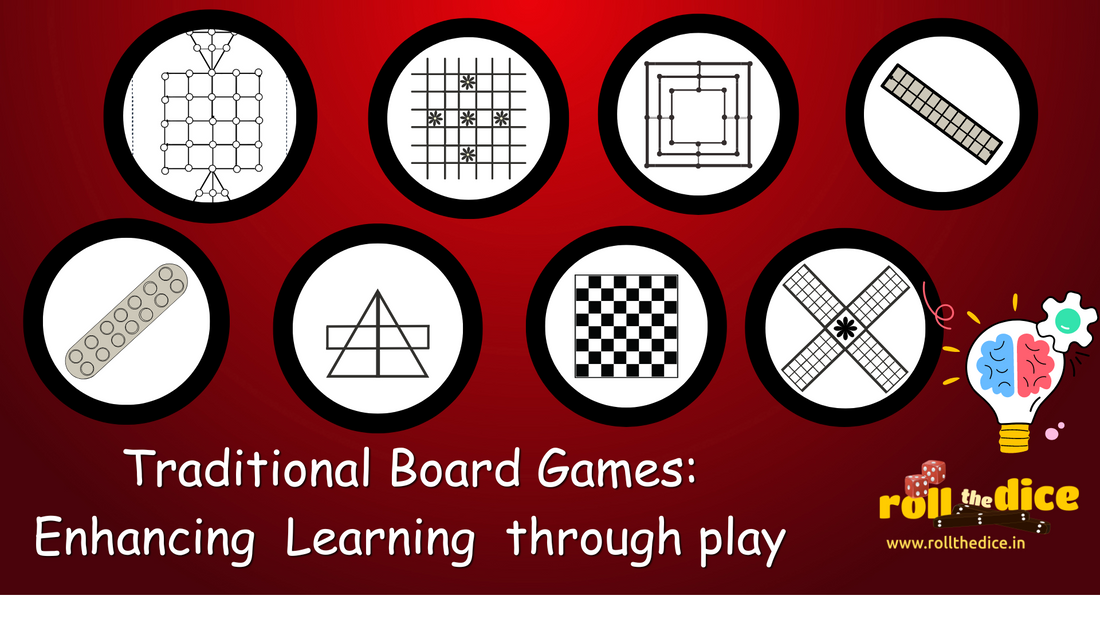
Traditional Indian Board Games as Educational Tools: Enhancing Learning Through Play
Share
Introduction
Board games , Indoor games have been an integral part of Indian culture for centuries. These games not only entertain but also offer a multitude of educational benefits. In today's fast paced world, it's important to explore alternative educational tools that promote cognitive development and critical thinking skills in kids. This blog will delve into how traditional Indian board games can be utilized as effective educational tools, fostering skills such as critical thinking, strategy, and problem-solving.
The Rich Heritage of Traditional Indian Board Games
India boasts a rich heritage of traditional board games, many of which have stood the test of time. Games like Chess, Pachisi (also known as Ludo), Chaupar, and parama pada sopana (also known as Snakes and Ladders) have been played by generations. Even now able to attract players with their simplicity and engaging gameplay. These games were not only meant for entertainment but were designed to impart valuable life skills and enhance brain functionalities.
Developing Critical Thinking Skills
Traditional Indian board games require players to think critically and strategically, thereby honing their analytical skills. Take Chess, for example. This game demands foresight, logical reasoning, and the ability to plan ahead. Players must analyze various moves, anticipate their opponent's strategies, and adapt their own gameplay accordingly. By engaging in such games, players develop critical thinking skills that can be applied to real-life situations, such as problem-solving and decision-making.
Cultivating Strategic Thinking
Strategy is a key element in traditional Indian board games. Games like Pachisi and Chaupar involve strategic decision-making, where players must navigate their pieces strategically to reach the goal while hindering their opponents' progress. By understanding the consequences of their actions and considering multiple possible outcomes, players develop a strategic mindset. This skill is invaluable in both academic and professional contexts, fostering the ability to plan, strategize, and adapt to changing circumstances.
Problem-Solving Abilities
Traditional Indian board games present players with various challenges and obstacles, requiring them to devise solutions and overcome them. For instance, Snakes and Ladders presents players with unpredictable situations where they must strategize their moves to climb ladders and avoid snakes. This game enhances problem-solving abilities by encouraging players to analyze the board, make informed decisions, and adapt to unexpected setbacks. Such problem-solving skills are transferrable to other domains, empowering individuals to tackle challenges effectively.
Social and Emotional Learning
Apart from cognitive benefits, traditional Indian board games promote social interaction and emotional learning. These games provide an opportunity for family and friends to come together, fostering meaningful connections and strengthening bonds. Through gameplay, players learn important social skills such as patience, sportsmanship, and teamwork. They also experience the joy of success, learn to cope with failure, and understand the importance of perseverance—a valuable lesson for both children and adults.
Preserving Cultural Heritage
By embracing traditional Indian board games as educational tools, we also preserve our cultural heritage. These games have been passed down through generations, reflecting the values and wisdom of our ancestors. Integrating them into educational settings not only instills pride in our cultural roots but also introduces younger generations to the richness and diversity of Indian traditions.
Traditional Indian board games are more than just sources of entertainment—they are educational tools that foster critical thinking, strategic planning, problem-solving, and social skills. By incorporating these games into educational settings, we can harness their potential to enhance learning experiences and promote cognitive development. As we navigate the digital age, it is crucial to remember the value of traditional games that engage the mind, nurture social connections, and preserve our cultural heritage. Let's encourage the use of these educational tools to empower the next generation of learners.
